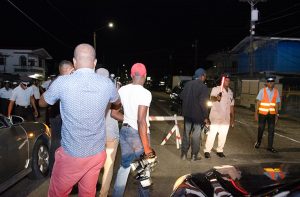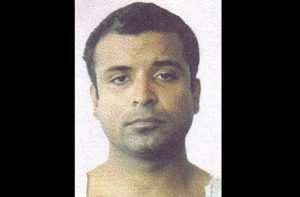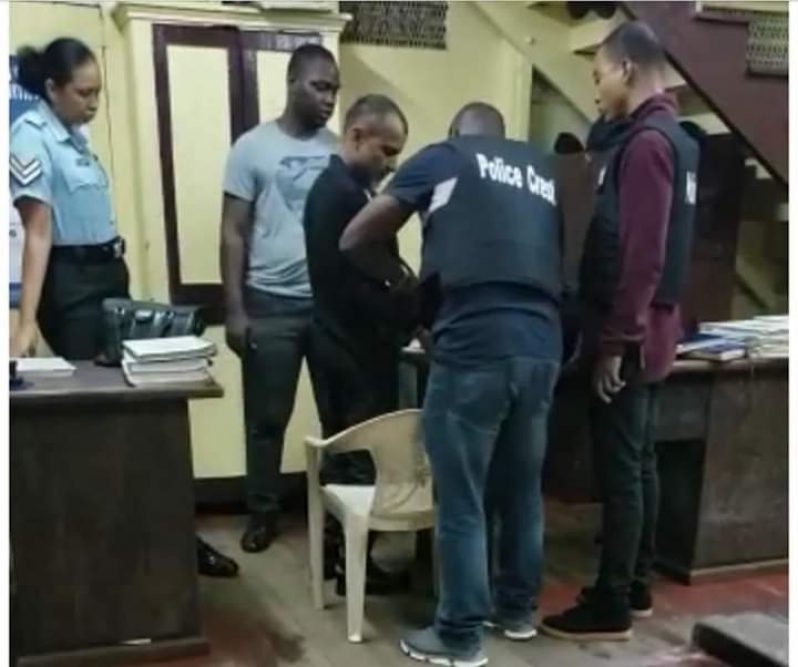UNDER heavy police guard, convicted drug lord Shaheed “Roger” Khan returned to Guyana and was whisked away from the tarmac of the Cheddi Jagan International Airport (CJIA) to police headquarters, Eve Leary, Georgetown.
Khan, who spent over eight years in a US detention facility, arrived in Guyana on Friday, minutes before midnight on an American Airlines flight from Miami. The notorious drug lord was quickly taken away through a south-western gate of the CJIA, in the presence of heavily-armed police.

Along the way to Georgetown, the GPF had organised two road blocks – one at Grove and another at Providence – to ensure that traffic was kept at bay from the white police vehicle which was carrying Khan to Eve Leary.
When the Guyana Chronicle arrived at the GPF’s Major Crimes Division, Eve Leary, Khan was already taken in for processing. Khan’s attorney, Glen Hanoman, was outside of the division awaiting word on when he would be able to speak to his client.
The attorney said he was not privy to any information and would be updated after meeting with his client. Sources said Khan is expected to be held for questioning over the next few days.
On 15 June, 2006, Khan was arrested in Paramaribo with three of his bodyguards in a sting operation that Suriname police said netted more than 200 kilograms of cocaine – the biggest cocaine haul in Suriname of that year.
Instead of being deported to Guyana, then Minister of Justice of Suriname, Chan Santokhi, ordered that Khan be flown to Trinidad. Upon arrival at the airport of Trinidad, Khan was handed over to immigration authorities who then handed him over to US officials.
Less than 24 hours after being expelled from Suriname, Khan was arraigned at the Brooklyn Federal Court in New York City on June 30 2006 on a charge of “conspiring to import cocaine” and was ordered to be detained at the Metropolitan Detention Centre in Brooklyn.
Khan, who was jailed in October 2009 for up to 15 years, asked the US court earlier this year to release him early, based on new regulations.
Khan was sentenced to a total of 40 years’ imprisonment on three separate charges by US Judge, Dora Irizarry, in 2009, after she accepted the plea bargain agreement he had reached with prosecutors.
However, two of the sentences, 10 years for an illegal firearm possession, and 15 years for witness tampering, ran concurrently with the other 15-year jail term.
In addition to the jail time, Roger Khan had to undergo supervised release for five years although according to the judge, he is to be deported. Khan was also accused of executing competitors in the drug trade.

Khan was considered to be the country’s most powerful drug trafficker.
He was said to have close ties to the then, People’s Progressive Party/Civic, with the late ex-Home Affairs Minister, Ronald Gajraj, acting as conduit for a “Phantom Squad”. The squad was accused to murdering several criminals, competitors, and others.
Although the PPP government had sought to distance itself from Khan, the drug-trafficker had stated publicly in an advertisement in local newspapers that he had been fighting crime on behalf of the Bharrat Jagdeo-led government.
Khan had also implicated former Health Minister, Dr Leslie Ramsammy, in his escapades, and documents bearing the then minister’s signature authorising the purchase of a sophisticated wire-tapping device were produced in U.S. courts during Khan’s trial.
President David Granger has referred to the Roger Khan-era as the “Troubles”; a period presided over by the Bharrat Jagdeo administration.
The President said it was the “darkest hour” that was characterised by drug-driven chaos and bloodshed. Jagdeo was President of Guyana from August 11, 1999 to December 3, 2011, during which there were three massacres: Lusignan, where 11 people were killed; Bartica, where another 12 were killed; and Lindo Creek, where seven miners were slaughtered. Besides, there were countless extra-judicial killings – with some activists estimating that around 400 Afro Guyanese males were gunned down.











